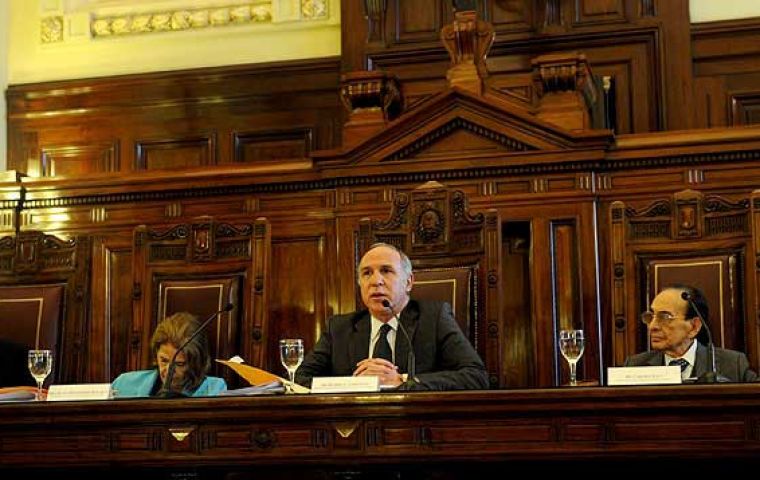MercoPress. South Atlantic News Agency
Supreme Court unanimously rejects Cristina Fernandez ‘extraordinary appeal’
 The seven Judges said a procedural error was committed in the filing of the request
The seven Judges said a procedural error was committed in the filing of the request The Argentine Supreme Court unanimously rejected on Monday the ‘per saltum’ filed by President Cristina Fernandez administration against the extension of the injunction decided by a federal court last week and which benefits the Clarin media group.
In the ruling the seven Judges explained that their decision to reject per saltum as ‘inadmissible’ was based on a procedural error during the administration’s request.
The decision was arrived at late afternoon after debating the issue for several hours with the attendance of all members: Chief Justice Ricardo Lorenzetti, Elena Highton de Nolasco, Juan Carlos Maqueda, Enrique Petracchi, Carmen Argibay, Carlos Fayt and Eugenio Zaffaroni.
The judges considered that the administration should have made the request to the Federal Court first before reaching to Supreme Court, because there is no first instance sentence yet.
“The current recourse has not been presented by a first instance federal Judge. This determines its inadmissibility since it does not adjust to what is demanded by the lawmaker, which makes the extraordinary appeal per saltum unviable”.
The per saltum recourse was presented by the Cabinet’s chief office under responsibility of Juan Manuel Abal Medina.
However the resolution also recommends that the plaintiff tries “the extraordinary recourse path”, which means it must again file before the Appeals court and then the way to the Supreme Court could be opened.
The administration of Cristina Fernandez and the Clarin media group have been clashing since the passing of the Media Law which was tailored precisely to break-up the Clarin ‘monopoly’ and that the government accuses of conspiring and ill informing.
Under the law the media groups are limited in the number of licences they can hold and Clarin is well rooted in television, cable, radio and the printed media (over 240 licences) with an annual turnover of over 2 billion dollars.
Article 161 from the 2009 Media Law which limits the number of licences also contemplates that the government can forcibly auction or sell the permissions if by December 7 the terms of the bill are not complied.
Clarin challenged the constitutionality of the article and asked for an injunction while the issue is considered. The media group alleges that 161 violates private property and freedom of expression.
Although the Supreme Court had established D7 as the time limit to comply, since the constitutionality controversy has not been yet decided, Clarin on D6 asked for a further injunction which was granted.
The Argentine government reacted immediately by presenting the per saltum recourse, which in serious institutional cases allows a direct appeal to the Supreme Court. The per saltum bill was approved a few weeks ago by the government’s majority anticipating such a situation.
The Cristina Fernandez administration was seeking a speedier resolution of the stand-off with per saltum which urged the Supreme Court to “immediately suspend” and “declare void” the lower court’s ruling.
However it is not clear if the government was expecting the unanimous rejection of the Supreme Court of per saltum. What is certain is that the Clarin Media group probably has won another couple of months since in mid December begins the judicial recess in Argentina until mid January.
On Sunday during the celebration of ‘Democracy Day’ and ‘Human Rights Day’ President Cristina Fernández made a tough speech against a “corporate” judiciary, which does not respect the will of the people and responds to economic power and the big corporations.
According to the regulatory body AFCSA Clarin has control over 41% of broadcasting; 38% of open television and 59% of cable television. The maximum established by the Media Law is 35%.




Top Comments
Disclaimer & comment rules-

-

-

Read all commentsWell done, Judges!!
Dec 11th, 2012 - 06:43 am 0A great exhibition of integrity and Rule of Law.
Your CommentSupreme Court unanimously rejects Cristina Fernandez ‘extraordinary appeal’
Dec 11th, 2012 - 07:18 am 0Good call
Guess who will be branded as “Terrorists” next.....................?
CFK I'd definitely losing her grip, as well as her mind.
Dec 11th, 2012 - 08:09 am 0Argentina might just have a future if the judiciary can keep itself seperate from the government. That is what makes democracy work and prevent dictatorship, having checks and balances to prevent one person from gaining ultimate power and assuming that the law doesn't apply to them. For that you need three seperate entities:
The executive - AKA the government that rules the country.
The senate or parliament - filled with elected representatives from the whole political spectrum whose job is to challenge the government on laws and policies it plans to enact.
The judiciary - those that ensure the law is applied equally to everyone without prejudice or favour.
Only when all these three arms of a country are working and completely free of interference can democracy truly exist.
Commenting for this story is now closed.
If you have a Facebook account, become a fan and comment on our Facebook Page!